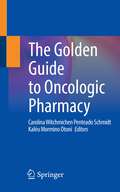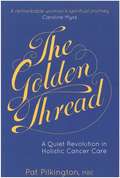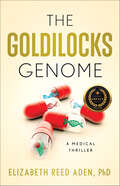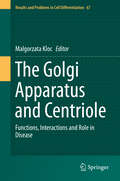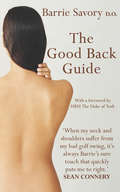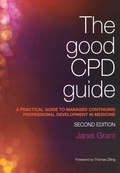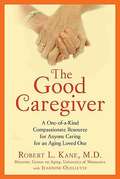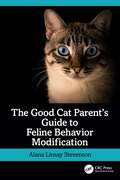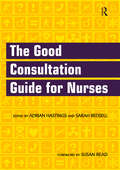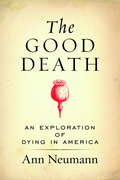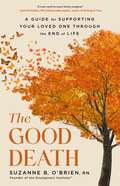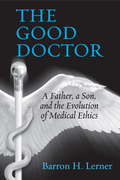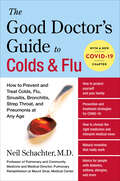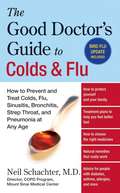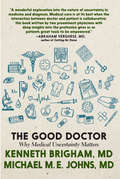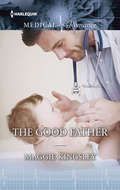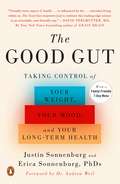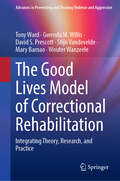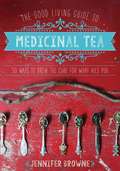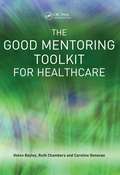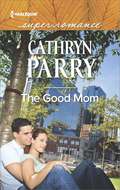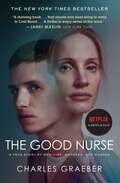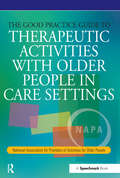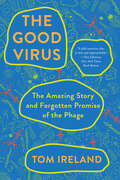- Table View
- List View
The Golden Guide to Oncologic Pharmacy
by Carolina Witchmichen Penteado Schmidt Kaléu Mormino OtoniThis book fills an important gap in the professional’s daily practice of both Oncology and Hematology. From the understanding of oncological and hematological diseases, drugs and protocols, to the administration of an oncology pharmacy, this book is an essential guide to supporting health professionals working or that intend to work in this area. This golden standard to practice is featured as a pocket guide easy to be carried around the hospital or clinic. The chapters cover topics such as support drugs; immunotherapy; CART-cells; chemotherapy for rheumatology, surgery and ICU; tumor lysis; extravasation; adverse effects; and stem cell transplantation. The content gathered in this volume is an invaluable resource not only to oncologic, clinical and hospital pharmacists, but also residents, postgraduate and undergraduate students.
The Golden Thread: A Quiet Revolution in Holistic Cancer Care
by Caroline Myss Felicity Biggart Pat PilkingtonPat Pilkington was co-founder of the Bristol Cancer Help Centre, the first charity to offer a truly holistic approach to cancer care. In this memoir, completed when she knew she was approaching death, Pat tells her story; starting with her childhood, through the early days of the Centre to its growth into Penny Brohn Cancer Care, the globally influential institution it is today. Above all, she shares her own spiritual journey, her deep exploration of faith, love, and what lies at the core of each human life and each human death. She speaks to life, not just to cancer, and shows how the restoration of the human spirit is an essential part of holistic healing. The Golden Thread of the title is the transcendent nature of love that runs though everything, awakening the potential to uplift, inspire, overcome and create anew, even in the face of severe adversity.
The Goldilocks Genome: A Medical Thriller
by Elizabeth Reed AdenWhen San Francisco–based FDA epidemiologist Dr. Carrie Hediger uncovers a rash of unexplained deaths while investigating the suspiciously convenient death of her best friend, she becomes determined to find answers—even if it leads her to a murderer, and even if confronting authority, using her wiles, and bending the rules to get justice risks her future in the FDA. To unravel the puzzle, Carrie assembles a team: some talented post-doctoral fellows, a quirky pharmacologist, an unctuous chemist, and a skeptical FBI agent that she can’t help her attraction for. Together, they follow the data through the twists and turns, eventually uncovering that the Goldilocks effect in prescription drugs—the premise that people are inclined to seek “just the right amount” of something—is central to understanding these mysterious deaths. Through the twists and turns, Carrie and her team enter a race to uncover the truth . . . and catch a killer. Grounded in real data analysis techniques, real science and pharmacology, and actual current psychiatric practices, The Goldilocks Genome is simultaneously a taut, race-against-time thriller and a condemnation of the psychiatric industry’s failure to implement genetic-based “personalized medicine”—a problem that persists to this day.
The Golgi Apparatus and Centriole: Functions, Interactions and Role in Disease (Results and Problems in Cell Differentiation #67)
by Malgorzata KlocThis volume takes a closer look how the cell organelles Golgi apparatus (also known as the Golgi complex or Golgi body), and centriole are structurally and functionally intertwined.Initially, it was believed that the role of Golgi complex is limited to the packaging and preparation for secretion of various cellular proteins, while the centriole participates in cell division and cilia formation. However, since their discovery nearly 200 years ago, it became clear that these two organelles are interacting, and that their functions are much more complex and far reaching than previously thought. Recent findings indicate that the Golgi–Centriole relationship may be important for directional protein transport, cell polarization and cell cycle progression. Current studies indicate that Golgi and centriole also participate in development and act as cellular and immunological sensors, and that their abnormalities lead to cell and developmental abnormalities, Alzheimer, cancer, various lipid disorders and neurological and immunological diseases in humans. This volume combines the latest information on the structure, molecular composition, and roles of Golgi and centriole in various cellular functions and diseases. The better understanding of the Golgi–centriole interactions may lead to the development of novel therapies for the treatment of various diseases, including cancer.
The Good Back Guide
by Barrie SavoryMore than 60% of the UK's population report regular back pain with the amount of working time lost, in the region of 119 million days a year. Not everyone has the time - or money - to visit chiropractors or osteopaths. Barrie Savory is one of Britain's leading osteopaths and draws on his many years of research, teaching and practise to provide an easy to follow guide to how we can all protect our backs and, if the damage has already been done, treat injuries and prevent further strain.Savory looks at the way in which we, as human beings, put our bodies through a series of potentially harmful positions as we go about our daily lives - from the way we get out of bed in the mornings, travel to work, sit at our desks, carry our shopping, watch TV - not to mention injuries through sex. Full of advice on diet, exercise, posture and relaxation, this guide is also packed with exercises that can be performed safely and easily at home to treat strains and injuries.
The Good CPD Guide: A Practical Guide to Managed Continuing Professional Development in Medicine, Second Edition
by Janet GrantThe role of continuing professional development (CPD) is increasingly crucial for regulators, educationalists and the healthcare profession. In terms of continued fitness to practise and patient safety, as well as maintaining professional standards, a more thoughtful, evidence-based and transparent approach should be considered. This book provides a concise overview of the literature whilst drawing on doctors' experiences, offering a practical approach to managing CPD. The systematic method ensures the interests of the service and regulators are met whilst enhancing the importance of high quality patient care and the needs of doctors as individuals. It focuses on the following key aspects: Relating CPD to the needs of the changing and developing health care service
The Good Caregiver
by Robert L. Kane Dr.A survival guide with an insider's perspective, for the millions of unprepared caregivers of aging loved ones. As Americans are living longer, an unprecedented number of people now require long-term care during their last years. More than 15 million adult children now care for their elderly parents, and unsuspecting caregivers are usually unprepared financially, emotionally, and practically for the relentless job they will face. In The Good Caregiver, world-renowned expert on aging and long- term care Dr.Robert Kane provides a road map for caregiving. More than just a professional expert, Dr. Kane draws on his personal experience of caring for his aging mother after she struggled from a debilitating stroke. Dr. Kane offers heartfelt advice for those learning how to best care for their loved one and how to make thoughtful, informed decisions at each stage of the caring process: ? How does a nursing home differ from assisted living? ? How is a homemaker different from a home health aide? ? How far can you trust a hospital discharge planner? ? What services does Medicare cover, and much, much more The Good Caregiver equips readers to deal more effectively with the challenges of day-to-day care and to navigate the system itself, including legal, financial, and interpersonal hurdles. Filled with stories and sidebars from other caregivers, The Good Caregiver offers a candid, personal approach to caregiving, providing fearless answers to difficult scenarios with humor and encouragement.
The Good Cat Parent’s Guide to Feline Behavior Modification
by Alana Linsay StevensonCats are cuddly and adorable, but they are often misunderstood. Sadly, many cats are relinquished to shelters or rehomed due to normal behaviors that are incorrectly treated or mishandled. In this book, Elite Fear-Free and Low-Stress Handling Certified author Alana Linsay Stevenson empowers cat parents and teaches them how to address and modify challenging feline behavior.You will begin by learning basic kitten care and feline developmental stages; how cats differ behaviorally from group animals, such as dogs and people; feline body language; and how cats handle stress. Alana provides concise instruction on how to gently handle cats: how to pick up and carry them, acclimate them to carriers, the use of towels, alternatives to scruffing, and how our body language affects cats. Packed with photographs for visual reference, this book offers clear guidelines and easily implementable strategies for resolving feline behavioral problems, such as: failure to use the litter box play aggression petting aggression inter-cat aggression furniture scratching jumping on counters obsessing about food night wailing fear of people aggression to strangers The content is organized by topic for easy access to information, as you need it.The Good Cat Parent’s Guide to Feline Behavior Modification is for anyone who likes cats and wants to learn more about them. Whether you are a veterinary professional, a volunteer or shelter worker who regularly handles stressed cats, or a cat parent who simply wants to understand your cat, you will find helpful and useful information at your fingertips to give cats a better quality of life. No cat parent should be without this book!
The Good Consultation Guide for Nurses
by Sarah Redsell Adrian Hastings Susan ReadThis invaluable guide for nurses improves the skills and knowledge required to consult effectively with patients. It is highly practical, easy to read and comprehend, and is designed for use in daily practice, and as an aid for professional development. The ‘Consultation Assessment and Improvement Instrument for Nurses’ (CAIIN) concept is introduced, and sample forms, suggested strategies and tables containing key information are also provided. The recent substantial changes that have taken place in health service structures, staffing arrangements and nursing practice have led to more nurses working in first contact roles and within nurse-led services. Nurses at all levels in primary and secondary care, including those in pre-registration training will find this guide vital, as will nurses considering taking on autonomous roles such as independent prescribing. It is also highly suitable for nurse lecturers, nurse managers, learning and health service managers, and undergraduate and postgraduate nursing students.
The Good Death
by Ann NeumannFollowing the death of her father, journalist and hospice volunteer Ann Neumann sets out to examine what it means to die well in the United States.When Ann Neumann's father was diagnosed with non-Hodgkin's lymphoma, she left her job and moved back to her hometown of Lancaster, Pennsylvania. She became his full-time caregiver--cooking, cleaning, and administering medications. When her father died, she was undone by the experience, by grief and the visceral quality of dying. Neumann struggled to put her life back in order and found herself haunted by a question: Was her father's death a good death?The way we talk about dying and the way we actually die are two very different things, she discovered, and many of us are shielded from what death actually looks like. To gain a better understanding, Neumann became a hospice volunteer and set out to discover what a good death is today. She attended conferences, academic lectures, and grief sessions in church basements. She went to Montana to talk with the attorney who successfully argued for the legalization of aid in dying, and to Scranton, Pennsylvania, to listen to "pro-life" groups who believe the removal of feeding tubes from some patients is tantamount to murder. Above all, she listened to the stories of those who were close to death.What Neumann found is that death in contemporary America is much more complicated than we think. Medical technologies and increased life expectancies have changed the very definition of medical death. And although death is our common fate, it is also a divisive issue that we all experience differently. What constitutes a good death is unique to each of us, depending on our age, race, economic status, culture, and beliefs. What's more, differing concepts of choice, autonomy, and consent make death a contested landscape, governed by social, medical, legal, and religious systems.In these pages, Neumann brings us intimate portraits of the nurses, patients, bishops, bioethicists, and activists who are shaping the way we die. The Good Death presents a fearless examination of how we approach death, and how those of us close to dying loved ones live in death's wake.From the Hardcover edition.
The Good Death: A Guide for Supporting Your Loved One through the End of Life
by Suzanne B. O’BrienPractical wisdom and holistic planning to ease life's most difficult transition, from an acclaimed hospice nurse, death doula, and end-of-life educator. Many of us have to show up for someone we love at the end of life. Knowing how to do that changes everything. With over twenty years of experience as a hospice nurse, palliative care professional, and founder of the Doulagivers Institute, Suzanne B. O&’Brien, RN has trained more than 350,000 people in what can be done to help the dying person, caregiver and other loved ones so they may move through each stage with as much comfort and ease as possible. In The Good Death, O&’Brien provides a comprehensive plan and the empowering knowledge to make a beautiful, sacred, and profound experience for everyone involved. Through practical advice, emotional support, and expert insights, O&’Brien gently holds your hand through every aspect of the process, including: · Learning how fear of death makes end of life harder, and how we can begin to quell it · Care instructions to ensure your loved one&’s comfort · Support system strategies to avoid burnout as a caregiver To further empower you in facilitating a good death, the second half of the book is presented workbook-style. The Peace of Mind Planner features prompts to initiate important conversations with your loved one about their physical, mental, emotional, financial, and spiritual preferences, and space to record this important information. The planner allows you to be fully present in these last precious moments, and come away with a thorough plan for your loved one&’s end- of- life wishes. With empathy and a careful approach, The Good Death is not only a comprehensive, compassionate, and in-depth resource, it is a beacon of hope and support.
The Good Doctor
by Barron H. LernerThe story of two doctors, a father and son, who practiced in very different times and the evolution of the ethics that profoundly influence health care As a practicing physician and longtime member of his hospital's ethics committee, Dr. Barron Lerner thought he had heard it all. But in the mid-1990s, his father, an infectious diseases physician, told him a stunning story: he had physically placed his body over an end-stage patient who had stopped breathing, preventing his colleagues from performing cardiopulmonary resuscitation, even though CPR was the ethically and legally accepted thing to do. Over the next few years, the senior Dr. Lerner tried to speed the deaths of his seriously ill mother and mother-in-law to spare them further suffering. These stories angered and alarmed the younger Dr. Lerner--an internist, historian of medicine, and bioethicist--who had rejected physician-based paternalism in favor of informed consent and patient autonomy. The Good Doctor is a fascinating and moving account of how Dr. Lerner came to terms with two very different images of his father: a revered clinician, teacher, and researcher who always put his patients first, but also a physician willing to "play God," opposing the very revolution in patients' rights that his son was studying and teaching to his own medical students. But the elder Dr. Lerner's journals, which he had kept for decades, showed the son how the father's outdated paternalism had grown out of a fierce devotion to patient-centered medicine, which was rapidly disappearing. And they raised questions: Are paternalistic doctors just relics, or should their expertise be used to overrule patients and families that make ill-advised choices? Does the growing use of personalized medicine--in which specific interventions may be best for specific patients--change the calculus between autonomy and paternalism? And how can we best use technologies that were invented to save lives but now too often prolong death? In an era of high-technology medicine, spiraling costs, and health-care reform, these questions could not be more relevant. As his father slowly died of Parkinson's disease, Barron Lerner faced these questions both personally and professionally. He found himself being pulled into his dad's medical care, even though he had criticized his father for making medical decisions for his relatives. Did playing God--at least in some situations--actually make sense? Did doctors sometimes "know best"? A timely and compelling story of one family's engagement with medicine over the last half century, The Good Doctor is an important book for those who treat illness--and those who struggle to overcome it.From the Hardcover edition.
The Good Doctor's Guide to Colds & Flu: How to Prevent and Treat Colds, Flu, Sinusitis, Bronchitis, Strep Throat, and Pneumonia at Any Age
by Neil SchachterFrom colds to COVID, a top pulmonologist’s guide to preventing and treating respiratory infections.From cold and flu to pneumonia and bronchitis; from tonsillitis and sinusitis to SARS and COVID-19: eminent Mount Sinai lung specialist and leading pulmonologist Neil Schacter, M.D., explains how to treat and prevent these illnesses. In The Good Doctor’s Guide to Colds and Flu, he describes how to avoid illness, boost immunity, and combat congestion, fever, and discomfort when cold, flu, and other respiratory infections strike. This updated edition includes:A new chapter with practical strategies on how to prevent, treat, and recover from COVID-19Prevention and treatment plans for the six most common respiratory infections: colds, influenza, sinusitis, bronchitis, tonsillitis, and pneumoniaHow to interpret medical newsThe four stages of a cold, and one of the best ways to avoid catching oneThe latest research on well-known cold remedies such as vitamin C, zinc, and echinaceaThe four major types of pneumonias, and the prevention technique that can eliminate more than eighty organisms that cause itWhy humming five seconds a day can reduce risk of sinus problemsThe surprising reason why women catch more coldsAdvice for people with diabetes, asthma, allergies, and more
The Good Doctor's Guide to Colds and Flu
by Neil SchachterThe latest and most effective information on preventing and treating colds and flu Under the weather? Eminent lung specialist Neil Schachter, M.D., arms you with the knowledge you need to boost immunity and avoid illness. And when colds, flu, and other respiratory infections do strike, you'll know exactly how to relieve uncomfortable symptoms like congestion and fever. In this book you'll find: Treatment plans for the most common respiratory infections, including colds, flu, bronchitis, pneumonia, sinusitis, and strep throat The right way to use vitamin C and zinc to combat a cold The important difference between a head cold and chest cold The five best ways to quiet a cough Three signs that indicate if it's a cold or flu Three symptoms that signal it's time to call a doctor Why humming five seconds a day can reduce risk of sinus problems The surprising reason why women catch more colds And much more With Dr. Schachter's guidance, you'll stay one step ahead of colds and flu.
The Good Doctor: Why Medical Uncertainty Matters
by Kenneth Brigham Michael M. JohnsWhat makes a good doctor? It's not what you think. A doctor willing to face their own uncertainty in the face of illness and treatment might just be the best medicine.Too often we choose the wrong doctor for the wrong reasons. It doesn't have to be that way. In The Good Doctor, Ken Brigham, MD, and Michael M.E. Johns, MD, argue that we need to change the way we think about health care if we want to be the healthiest we can be. Counterintuitive as it may seem, uncertainty is integral to medicine, and you want a doctor who knows that: someone who sees you as the unique case you are, someone who knows that data isn't everything, someone who is able to change her mind as the information changes. For too long we've clung to the myth of the infallible doctor--one who assuredly tells us this is what's wrong and here is how I will cure you--and our health has suffered for it. Brigham and Johns propose a new model of medicine, one that is comfortable with ambiguity and that centers on an equal partnership between patient and doctor. Uncertainty, properly embraced, opens a new universe of possibilities.
The Good Doctors: The Medical Committee for Human Rights and the Struggle for Social Justice in Health Care
by John DittmerIn the summer of 1964 medical professionals, mostly white and northern, organized the Medical Committee for Human Rights (MCHR) to provide care and support for civil rights activists organizing black voters in Mississippi. They left their lives and lucrative private practices to march beside and tend the wounds of demonstrators from Freedom Summer, the March on Selma, and the Chicago Democratic Convention of 1968. Galvanized and sometimes radicalized by their firsthand view of disenfranchised communities, the MCHR soon expanded its mission to encompass a range of causes from poverty to the war in Vietnam. They later took on the whole of the United States healthcare system. MCHR doctors soon realized fighting segregation would mean not just caring for white volunteers, but also exposing and correcting shocking inequalities in segregated health care. They pioneered community health plans and brought medical care to underserved or unserved areas. Though education was the most famous battleground for integration, the appalling injustice of segregated health care levelled equally devastating consequences. Award-winning historian John Dittmer, author of the classic civil rights history Local People: The Struggle for Civil Rights in Mississippi, has written an insightful and moving account of a group of idealists who put their careers in the service of the motto “Health Care Is a Human Right.”
The Good Father
by Maggie KingsleyTaming the boss... Neonatologist Gabriel Dalgleish is passionate about his tiny patients, and highly demanding about their care. It seems as if they are the only people he really cares for. Except for Maddie. The new medical secretary slips through Gabriel's defenses, right to his vulnerable heart, making him realize everything he's missed out on in life.Yet Gabriel feels he can never be what Maddie and her young family deserve. Maddie must show him that he doesn't have to be the perfect father and husband-- just a good one. All he needs to give them is his love.
The Good Gut: Taking Control of Your Weight, Your Mood, and Your Long-term Health
by Andrew Weil Erica Sonnenburg Justin SonnenburgThe groundbreaking science behind the surprising source of good health Stanford University's Justin and Erica Sonnenburg are pioneers in the most exciting and potentially transformative field in the entire realm of human health and wellness, the study of the relationship between our bodies and the trillions of organisms representing thousands of species to which our bodies play host, the microbes that we collectively call the microbiota. The microbiota interacts with our bodies in a number of powerful ways; the Sonnenburgs argue that it determines in no small part whether we're sick or healthy, fit or obese, sunny or moody. The microbiota has always been with us, and in fact has coevolved with humans, entwining its functions with ours so deeply, the Sonnenburgs show us, humans are really composite organisms having both microbial and human parts. But now, they argue, because of changes to diet, antibiotic over-use, and over-sterilization, our gut microbiota is facing a "mass extinction event," which is causing our bodies to go haywire, and may be behind the mysterious spike in some of our most troubling modern afflictions, from food allergies to autism, cancer to depression. It doesn't have to be this way. The Good Gut offers a new plan for health that focuses on how to nourish your microbiota, including recipes and a menu plan. In this groundbreaking work, the Sonnenburgs show how we can keep our microbiota off the endangered species list and how we can strengthen the community that inhabits our gut and thereby improve our own health. The answer is unique for each of us, and it changes as you age. In this important and timely investigation, the Sonnenburgs look at safe alternatives to antibiotics; dietary and lifestyle choices to encourage microbial health; the management of the aging microbiota; and the nourishment of your own individual microbiome. Caring for our gut microbes may be the most important health choice we can make.From the Hardcover edition.
The Good Lives Model of Correctional Rehabilitation: Integrating Theory, Research, and Practice (Advances in Preventing and Treating Violence and Aggression)
by Tony Ward David S. Prescott Gwenda M. Willis Stijn Vandevelde Mary Barnao Wouter WanzeeleThe book examines the Good Lives Model (GLM) of correctional rehabilitation and its dual aims of risk reduction and well-being enhancement for individuals who have committed crimes. It describes the use of individuals’ prioritized values in intervention plans and to capitalize on and further develop their strengths and reduce the risk for future offending. The book directly addresses the differences between purely risk-oriented rehabilitation correctional models (e.g., Risk-Need-Responsivity Model) and strength-based approaches (e.g., GLM) and the clinical advantages of using the latter. It updates the GLM in the context of recent work in evolutionary biology, quality of life and well-being, cognitive neuroscience, developmental psychology, human rights, naturalistic ethics, criminology, desistance research, and theoretical reformulations of dynamic risk and protective factors. Case studies illustrate the detailed application of GLM evidence-based practice plans to adults convicted of crimes and demonstrate the effectiveness of GLM intervention strategies. Key areas of coverage include: GLM community and within-prison intervention strategies. Incorporating dynamic risk factors into GLM case formulations. Incorporating desistance research in postrelease planning and practice. Policy implications of the GLM. The Good Lives Model of Correctional Rehabilitation is a must-have resource for clinicians, therapists, and other professionals as well as researchers, professors, and graduate students in developmental psychology, family studies, forensic psychology, criminology/criminal justice, public health, psychotherapy/counseling, psychiatry, social work, educational policy and politics, health psychology, nursing, and behavioral therapy/rehabilitation.
The Good Living Guide to Medicinal Tea: 50 Ways to Brew the Cure for What Ails You
by Jennifer BrowneMore than just a warm and comforting drink, tea has medicinal properties that are widely underused in North America. Common herbs, spices, fruits, and barks have been scientifically proven to help relieve pain, menopause symptoms, high blood pressure, insomnia, stress, and digestive angst. When taken preventatively, certain herbs in tea can help fight off cancer cells, heart disease, and even Alzheimer’s disease and fibromyalgia. By learning about what these various natural ingredients are capable of and how they work, readers can begin to treat many ailments with what grows in their gardens--plants that have been used in eastern medicine for thousands of years. The Good Living Guide to Medicinal Tea invites readers into a world of medicinal plants, instructs on the specific healing properties of each, matches them to ten common North American health disorders, and provides simple tea recipes readers can make in their own homes. Late Japanese author Okakura Kakuzo has been famously quoted as saying, "Tea began as a medicine and grew into a beverage. ” The Good Living Guide to Medicinal Tea encourages readers to turn their favorite drink back into medicine--and outlines exactly how to accomplish this. With the help of beautiful photographs and an easy dialogue, Jennifer Browne clearly explains to readers how teatime can garner impressive health benefits.
The Good Mentoring Toolkit for Healthcare
by Ruth Chambers Helen Bayley Caroline DonovanThis book examines how nurses will provide a first-point-of-contact consultation service as an alternative to going to see the doctor. It analyses the different nurse practitioner models around the world and presents a proposal for the UK, using research material to describe the impact of this kind of nurse practitioner on patients, doctors and other nurses. The book proposes practical steps through which this model can be implemented within Primary Care Groups, and considers the professional implications for doctors and nurses. Among the conclusions reached in the book are: * nurse practitioners are acceptable to both colleagues and patients * they will have an increasing impact on the nature of the work of doctors * the role of general practitioners may develop to complement the emerging role for nurses. The book is relevant and important reading for everyone who will be affected by these developments, including nurses, doctors, health service managers and policy makers.
The Good Mom
by Cathryn ParryIt's all for Brandon Single mom Ashley LaValley will do anything to help her twelve-year-old son, a cancer survivor, achieve his dream of becoming a doctor. Even uproot their lives and relocate to Boston when Brandon gets a scholarship to an exclusive prep school. Even accept help when Brandon risks flunking out... Even when that help comes from Dr. Aidan Lowe, an arrogant, abrasive man recently returned from a stint in Afghanistan. But the guy's also charismatic and wickedly sexy. Ashley's spent years putting her son's needs first. Now Aidan's reminding her that she has needs of her own...
The Good Nurse: A True Story of Medicine, Madness, and Murder
by Charles GraeberAfter his December 2003 arrest, registered nurse Charlie Cullen was quickly dubbed "The Angel of Death" by the media. But Cullen was no mercy killer, nor was he a simple monster. He was a favorite son, husband, beloved father, best friend, and celebrated caregiver. Implicated in the deaths of as many as 300 patients, he was also perhaps the most prolific serial killer in American history. Cullen's murderous career in the world's most trusted profession spanned sixteen years and nine hospitals across New Jersey and Pennsylvania. When, in March of 2006, Charles Cullen was marched from his final sentencing in an Allentown, Pennsylvania, courthouse into a waiting police van, it seemed certain that the chilling secrets of his life, career, and capture would disappear with him. <p><p> Now, in a riveting piece of investigative journalism nearly ten years in the making, journalist Charles Graeber presents the whole story for the first time. Based on hundreds of pages of previously unseen police records, interviews, wire-tap recordings and videotapes, as well as exclusive jailhouse conversations with Cullen himself and the confidential informant who helped bring him down, THE GOOD NURSE weaves an urgent, terrifying tale of murder, friendship, and betrayal. Graeber's portrait of Cullen depicts a surprisingly intelligent and complicated young man whose promising career was overwhelmed by his compulsion to kill, and whose shy demeanor masked a twisted interior life hidden even to his family and friends. <p><p> Were it not for the hardboiled, unrelenting work of two former Newark homicide detectives racing to put together the pieces of Cullen's professional past, and a fellow nurse willing to put everything at risk, including her job and the safety of her children, there's no telling how many more lives could have been lost. In the tradition of In Cold Blood, THE GOOD NURSE does more than chronicle Cullen's deadly career and the breathless efforts to stop him; it paints an incredibly vivid portrait of madness and offers a penetrating look inside America's medical system. Harrowing and irresistibly paced, this book will make you look at medicine, hospitals, and the people who work in them, in an entirely different way.
The Good Practice Guide to Therapeutic Activities with Older People in Care Settings (Speechmark Editions)
by Tessa PerrinThere are many activity manuals on the market today but this publication is the first to offer a clear guideline on exactly what constitutes good practice in activity provision. Written by the National Association for Providers of Activities for Older People (NAPA), a charity whose remit is to set standards and disseminate knowledge of good practice in activity provision and to support activity providers who work in care settings for older people, this guide offers: a model of good practice in one concise volume; a benchmark against which activity providers can measure and evaluate their practice; clear links to current national standards; guidance for care home owners and managers who wish to respond to the recent government initiatives on providing activities for their clients; and a call for clinical governance in the emerging 'profession' of activity provision.
The Good Virus: The Amazing Story and Forgotten Promise of the Phage
by Tom IrelandA New York Times Editors’ Choice “A deft narrative that is rich and approachable.” —Alex Johnson, New York Times Book Review How a mysterious, super-powerful—yet long-neglected—microbe rules our world and can rescue our health in the age of antibiotic resistance. At every moment, within our bodies and all around us, trillions of microscopic combatants are waging a war that shapes our health and life on Earth. Countless times per second, viruses known as phages attack and destroy bacteria while leaving all other life forms, including us, unscathed. Vastly outnumbering the viruses that do us harm, phages power ecosystems, drive evolutionary innovation, and harbor a remarkable capacity to heal life-threatening infections when conventional antibiotics fail. Yet most of us have never heard of them, thinking of viruses only as enemies to be feared. The Good Virus prompts us to reconsider, and to discover, how these viruses could save countless lives if we can learn to harness their extraordinary abilities. Taking us inside the ongoing quest to use phages’ powers for good, Tom Ireland introduces us to the brilliant, often eccentric, scientists who have fought to realize phages’ potential in the face of doubt and political intrigue. We meet the renegade French-Canadian scientist who discovered phages and pioneered their use as medicine over a century ago, leading them to be hailed as the world’s first genuine antibiotic years before penicillin. We learn why, in some pockets of the former Soviet Union, drinking a vial of phages remains as common as taking an over-the-counter drug. We follow the intrepid scientists and doctors now racing to make “phage therapy” work worldwide as the threat of antibiotic-resistant bacteria grows ever more urgent—even as other researchers uncover how phages bolster our everyday immunity, help generate the oxygen we breathe, and furnish the origins for breakthrough technologies like CRISPR. Unveiling the hidden rulers of the microbial world and celebrating the surprising power of viruses to heal, not harm, The Good Virus forever changes how we see nature’s most maligned life forms.
